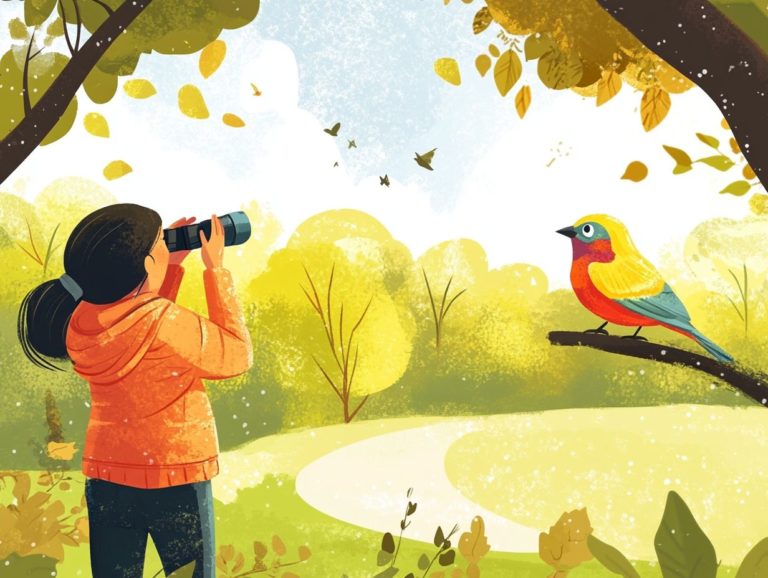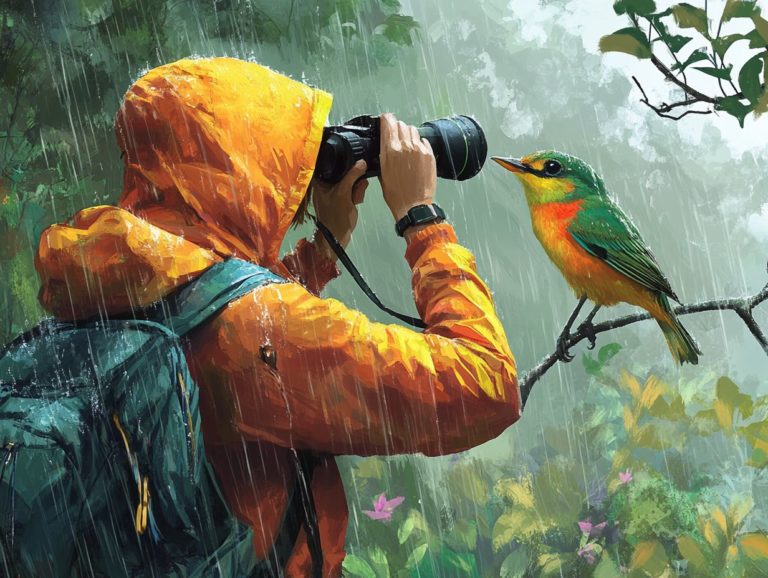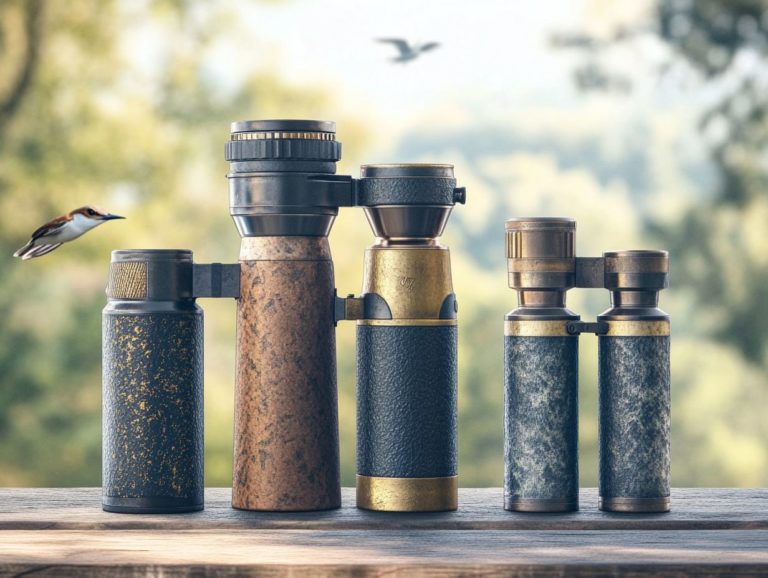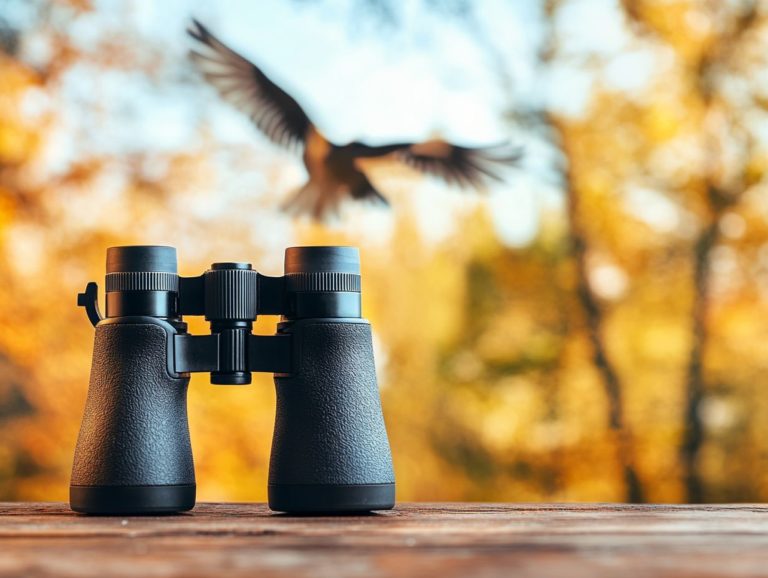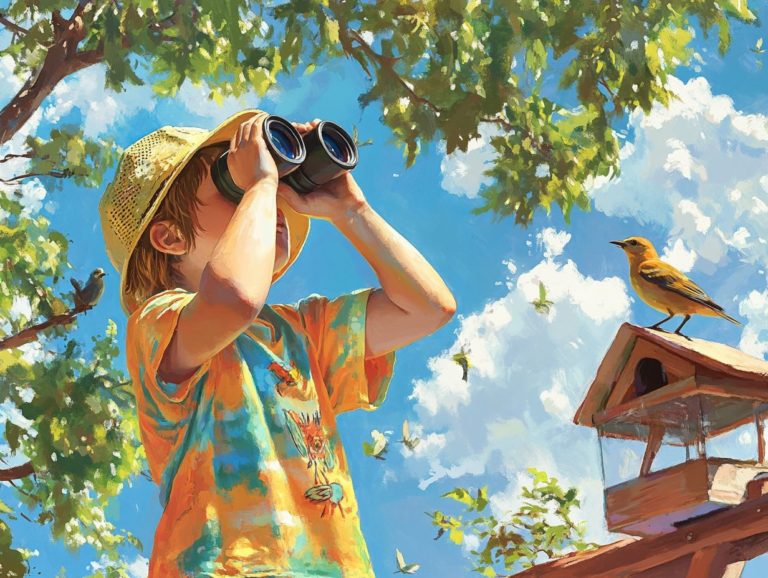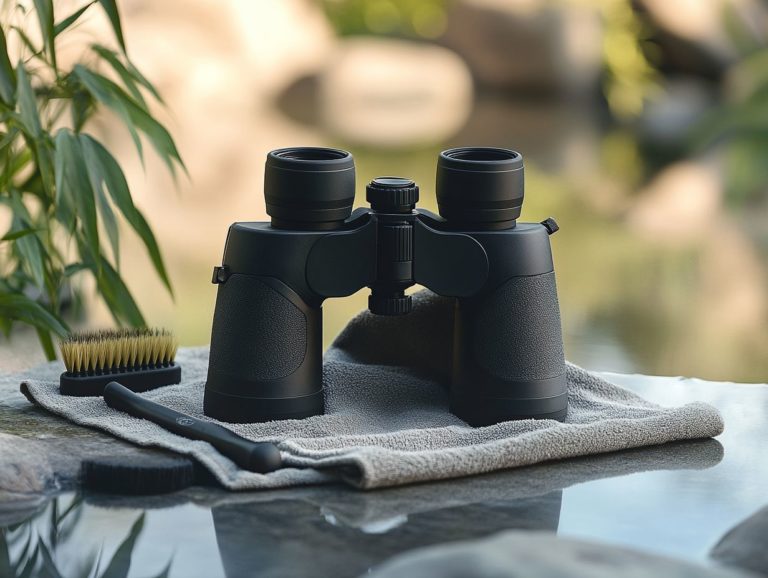The Role of Binoculars in Bird Conservation
Bird conservation is vital for biodiversity. Protecting our avian companions is essential.
This article explores how binoculars help in bird conservation. They enhance your birdwatching experience and research while minimizing disturbance to birds.
You will learn how to select the perfect binoculars, explore best practices for responsible birdwatching, and uncover inspiring success stories that highlight the positive influence of binoculars in conservation initiatives.
Embark on this journey as you discover the harmonious relationship between birdwatching and conservation. Find out how you can make a meaningful contribution to this crucial endeavor.
Contents
- Key Takeaways:
- The Importance of Bird Conservation
- How Binoculars Aid in Bird Conservation
- Choosing the Right Binoculars for Birding
- Top Tips for Bird Conservation with Binoculars
- Impact of Binoculars on Bird Conservation Efforts
- Frequently Asked Questions
- What is the role of binoculars in bird conservation?
- How do binoculars aid in bird conservation efforts?
- Can anyone use binoculars for bird conservation?
- What features should I look for in binoculars for bird conservation?
- Do binoculars have any negative impact on birds?
- How can binoculars benefit birds in the long run?
Key Takeaways:
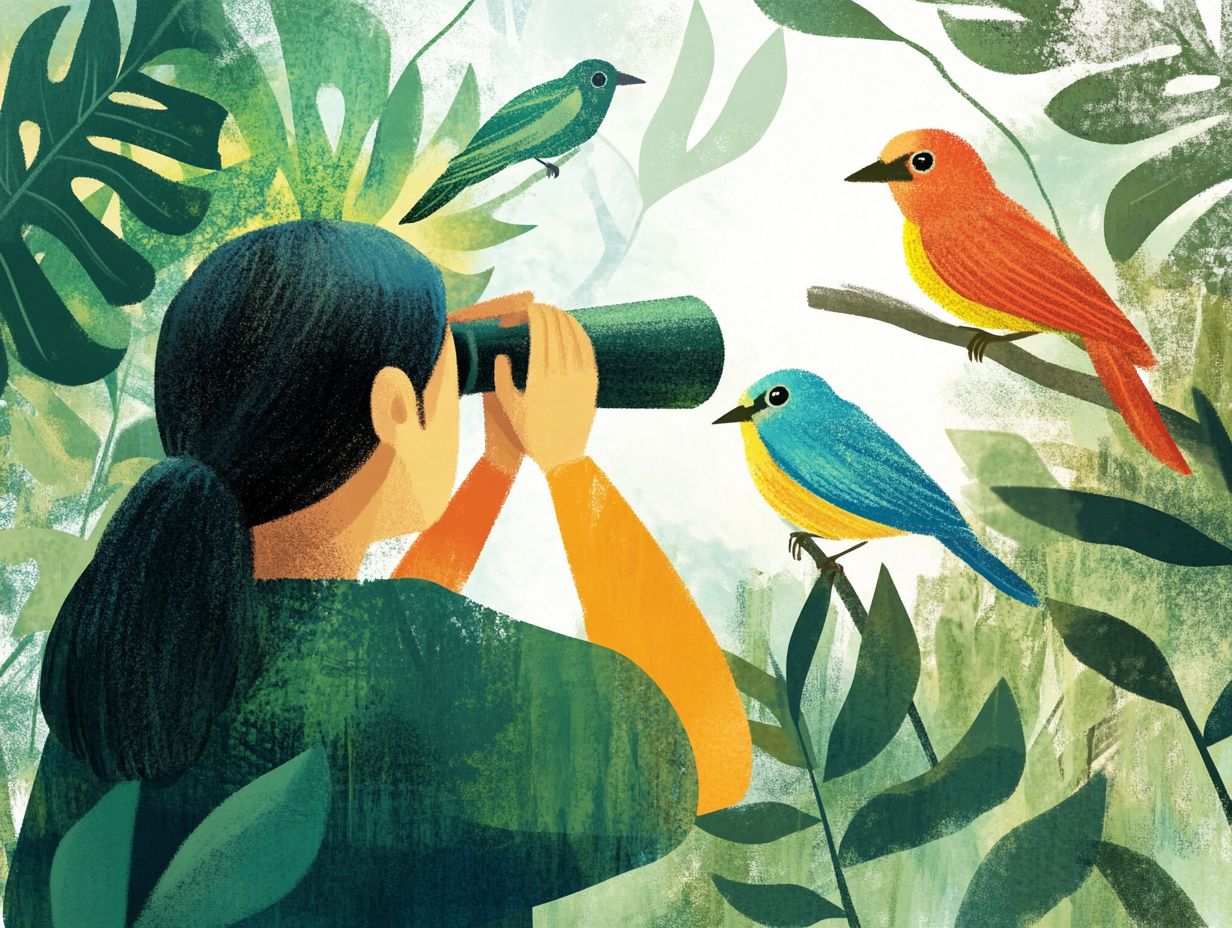
- Protecting birds keeps our ecosystems healthy and rich in diversity!
- Binoculars play a vital role in bird conservation by aiding in birdwatching and research while minimizing disturbance to birds.
- When choosing binoculars for birding, consider factors such as magnification power (how much closer you can see), lens size, and weight for the best viewing experience, including options like 10-power binoculars and 7-power binoculars.
The Importance of Bird Conservation
Bird conservation is essential for maintaining ecological balance and preserving biological diversity. It ensures that you and future generations can appreciate the beauty and importance of birds in our environment.
When bird populations decline, it directly affects ecosystems. Birds play crucial roles in seed dispersal, pollination, and pest control.
Organizations like the Audubon Center and the American Birding Association are at the forefront of conservation efforts. They work to protect these species and their habitats while promoting sustainable development practices that allow for a harmonious coexistence between humans and wildlife.
This initiative not only safeguards bird species but also deepens your understanding of the environment and its intricate complexities.
Why Protecting Birds is Essential
Protecting birds is crucial, as they act as indicators of environmental health and significantly contribute to biodiversity. Their contributions to ecosystems go far beyond merely enhancing the beauty of nature. By engaging in pollination, birds facilitate the reproduction of numerous flowering plants, which supports a variety of wildlife.
Birds serve as natural pest controllers, managing insect populations and minimizing the need for chemical interventions that can disrupt delicate ecosystems. When conservation efforts take precedence, the stability of these ecosystems is strengthened, bringing benefits that extend to human well-being.
Healthy bird populations can lead to improved agricultural yields, enriched soil health, and a more balanced environment, reinforcing the idea that their protection is a vital component of sustainable living.
How Binoculars Aid in Bird Conservation
Binoculars are an essential companion for birding enthusiasts and researchers. They elevate your ability to observe and study bird species in their natural habitats without causing disruption. When you choose the right pair of high-quality binoculars, you gain the opportunity to appreciate the intricate details of various birds. This precision is crucial for identification and understanding their behaviors.
In the realm of conservation, binoculars enhance wildlife viewing. They foster appreciation and awareness that inspire you to engage in initiatives aimed at protecting avian populations, as demonstrated in resources like the Audubon Guide.
Enhancing Bird Watching and Research
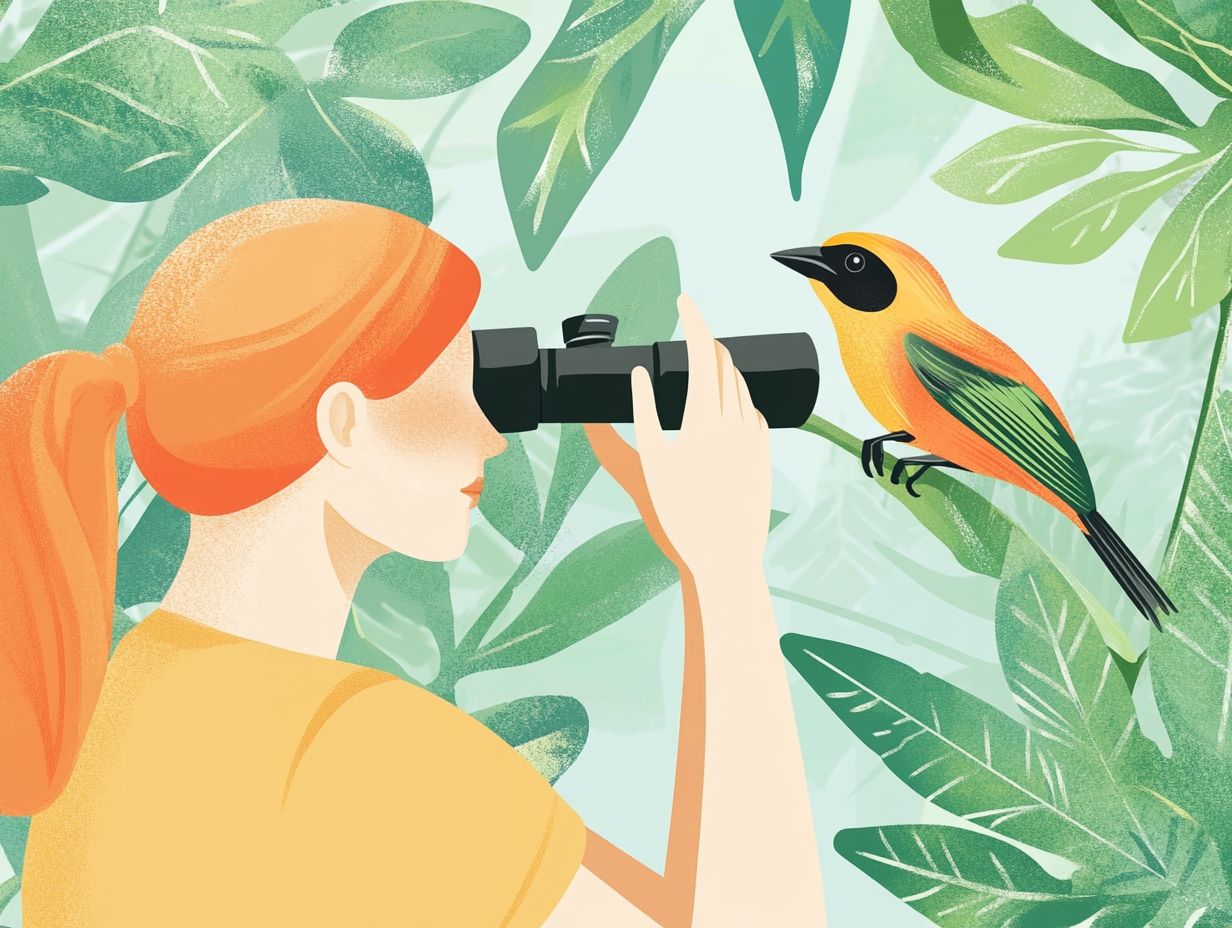
The right binoculars can enhance your bird watching experience. Whether you re an amateur or a seasoned expert, you ll conduct research with better accuracy and detail.
The perfect binoculars can truly elevate your birding adventures. Features like magnification power enable you to observe distant birds with clarity while keeping them undisturbed in their natural habitat.
A wide field of view makes tracking fast-moving avian species effortless, turning the spotting process into a delightful endeavor.
Close focusing ability is essential. It lets you appreciate the intricate details of birds that land nearby.
Quality optics are crucial, providing you with crystal-clear images that enrich your overall observation experience.
Resources like Audubon magazine offer invaluable insights and techniques, empowering you to refine your skills and become a more effective bird watcher.
Reducing Disturbance to Birds
Reducing disturbance to birds during observation is essential for ethical bird watching. This fosters a harmonious connection between wildlife enthusiasts and avian species.
To achieve this, maintain a respectful distance while utilizing binoculars. Ensure that your presence doesn t intrude on the birds’ natural behaviors.
Approaching quietly and avoiding sudden movements are crucial in preventing stress to wildlife. Understanding the specific habitats and routines of various species enhances your observation experience without causing disruption.
By embracing these responsible practices, you re enriching your own experience while contributing to broader conservation efforts. Your actions help pave the way for habitat protection and promote a deeper understanding of ecological balance. This ensures that future generations can also revel in the beauty of nature.
Choosing the Right Binoculars for Birding
When selecting the ideal binoculars for birding, it s essential to consider key factors that can elevate your birdwatching experience. Think about magnification power, field of view, and quality of optics each plays a pivotal role in how you perceive the avian world around you.
High-quality binoculars deliver bright, clear images and offer a wider field of view, which is crucial for tracking elusive, fast-moving birds.
Features like adjustable eyepieces and weatherproofing enhance comfort and usability across various environments. These binoculars are a must-have for both casual enthusiasts and dedicated ornithologists!
Factors to Consider
When selecting binoculars for birding, consider key factors like magnification power, field of view, and portability. Compact binoculars often take the crown for their convenience.
Understanding how magnification power affects your viewing distance is essential. While higher magnification can bring distant birds into sharper focus, it may also introduce image stability issues.
A narrower field of view can make tracking swift feathered friends quite the challenge, which is why a wider field of view is essential for birdwatchers who want to follow these creatures in their natural habitats.
The benefits of compact designs cannot be overstated. Lightweight and easily portable, these binoculars empower you to explore diverse environments without the hassle of bulky gear!
Seize spontaneous birdwatching opportunities today!
Top Tips for Bird Conservation with Binoculars
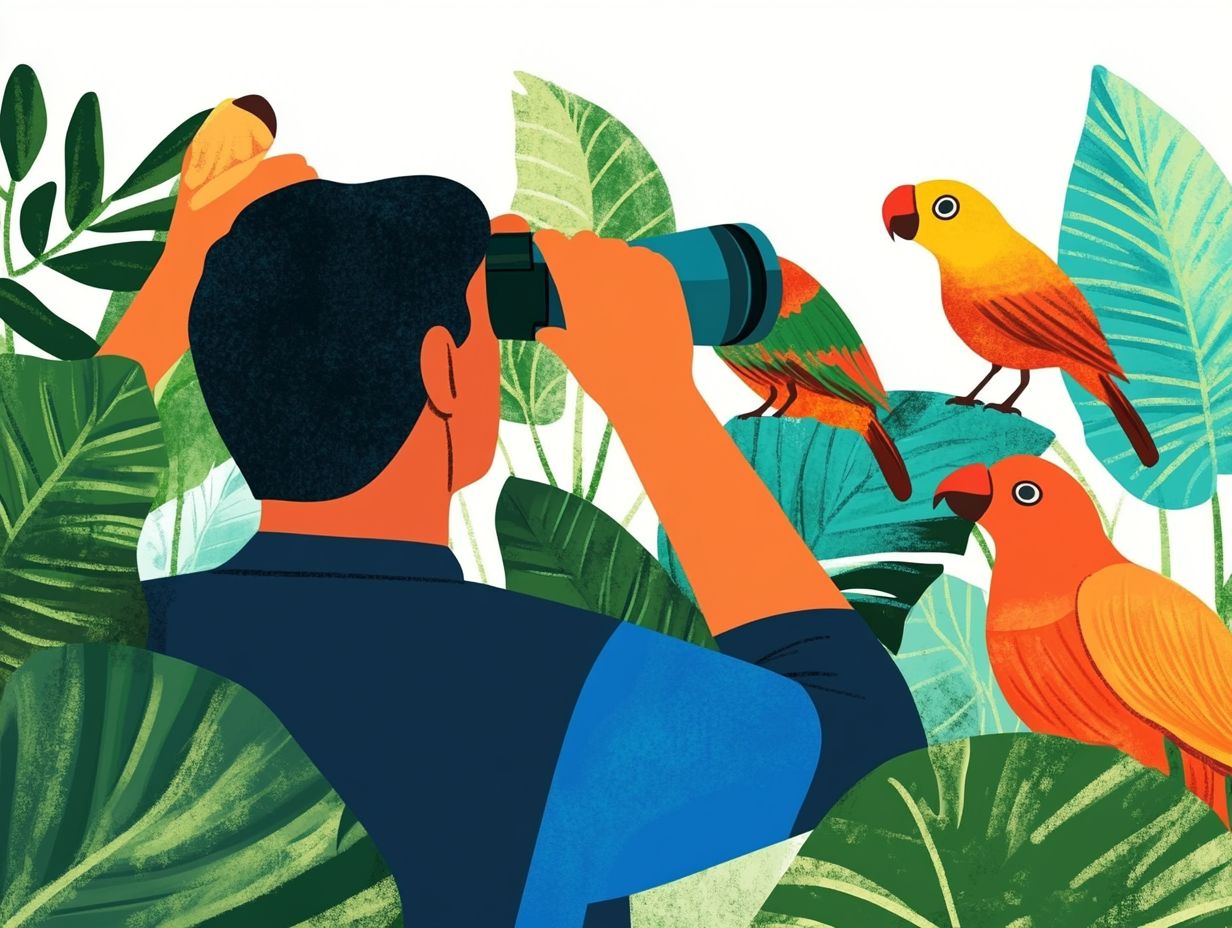
Implementing best practices while using binoculars in bird conservation not only elevates your birdwatching experience but also plays a vital role in protecting bird species and their habitats!
Understanding how to use binoculars responsibly like observing from a distance and being mindful of your impact on wildlife is essential for effective conservation efforts.
This thoughtful approach aligns with the broader goals of organizations committed to preserving avian diversity. It ensures that you act as a steward rather than an intruder in these precious natural ecosystems.
Join the bird watching community today and make a difference!
Responsible Bird Watching Techniques
Bird watching is thrilling! Let s explore how to enjoy this hobby responsibly. Responsible bird watching techniques are essential for you to fully enjoy your hobby while minimizing disturbances to both birds and their habitats.
When you follow ethical practices, you can elevate your experiences while actively promoting the well-being of avian species. Maintaining a respectful distance is crucial; using special glasses that help you see far away, like binoculars or scopes, allows you to appreciate the beauty of birds without intruding on their personal space.
Remember, loud noises can startle them, causing stress and disrupting their normal activities, so keeping your voice low is not just polite it’s necessary.
Be aware of nesting sites, especially during breeding season, to protect vulnerable species. By fostering a harmonious relationship with wildlife, you help protect birds and their homes while deepening your understanding of nature’s delicate balance.
Impact of Binoculars on Bird Conservation Efforts
The impact of binoculars on bird conservation efforts is truly remarkable. They not only elevate your personal experiences but also contribute to a larger movement dedicated to protecting avian species and their habitats, especially when considering the role of ergonomics in birding binoculars.
By enabling you to observe birds up close without causing any harm, binoculars deepen your appreciation for wildlife, which naturally inspires advocacy for conservation. This intimacy with nature demonstrates how effective bird watching can catalyze meaningful conservation initiatives. Whether you use pocket-sized binoculars or zoom binoculars, the experience enhances your connection to nature.
Success Stories and Examples
Success stories in bird conservation frequently emphasize the crucial role binoculars, including weatherproof models, play in raising awareness and inspiring action within individuals and communities.
Consider a local initiative in the Pacific Northwest, highlighted in the Audubon Guide, where community members used binoculars, such as the Nikon Monarch M7 and Vortex Viper HD, to identify and monitor the populations of migratory songbirds. This grassroots movement not only led to the establishment of protected habitats but also empowered individuals to advocate for policy changes that bolster biodiversity.
Such projects illustrate how bird watching can serve as a gateway for many, including members of the American Birding Association, to engage deeply with environmental issues. This nurtures a sense of collective responsibility that extends beyond simple observation to active participation in conservation efforts, such as biological conservation initiatives.
Frequently Asked Questions
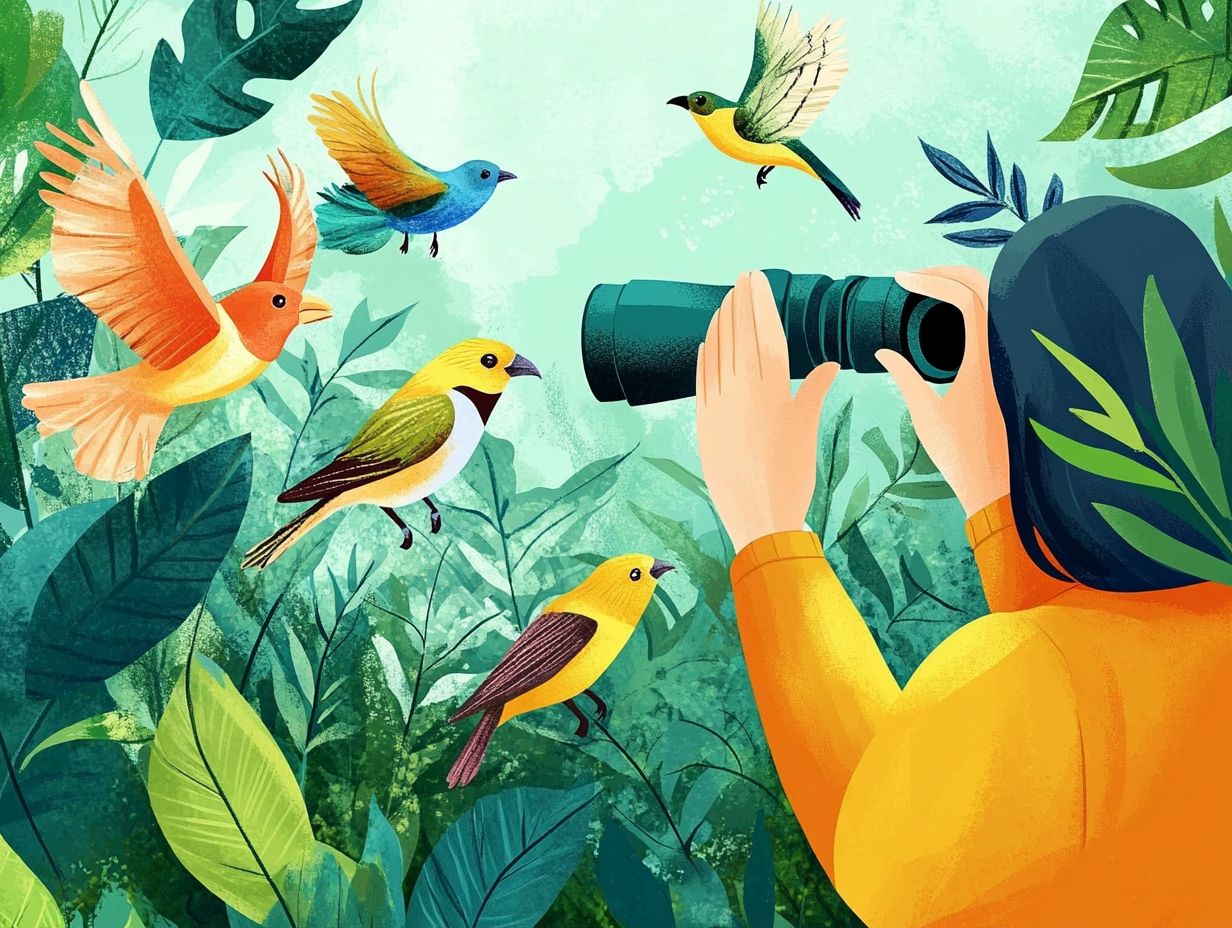
What is the role of binoculars in bird conservation?
Binoculars, especially those with features like coated optics and diopter adjustment, play a crucial role in bird conservation by allowing bird watchers to observe and study birds without disturbing their natural habitats.
How do binoculars aid in bird conservation efforts?
Binoculars help bird conservation efforts by providing valuable information about bird behavior, population trends, and habitat usage. Learning how to use binoculars effectively for bird identification can further enhance your observations, informing conservation and management decisions.
Can anyone use binoculars for bird conservation?
Yes, anyone can use binoculars for bird conservation, from professional researchers to casual bird watchers. All it takes is a pair of binoculars, such as roof prism or porro prism models, and a passion for protecting our feathered friends.
What features should I look for in binoculars for bird conservation?
When choosing binoculars for bird conservation, look for features such as high magnification, wide field of view, weatherproof designs, and eye relief for optimal bird viewing in different environments.
Do binoculars have any negative impact on birds?
No, binoculars do not negatively impact birds. In fact, they help reduce disturbance to birds by allowing observers to maintain a safe distance while still enjoying a close-up view. This is especially true for models with proper eye relief and focused optics.
How can binoculars benefit birds in the long run?
Binoculars play a crucial role in bird conservation, as they help protect and preserve bird populations for future generations. For more insights, check out the importance of binoculars in birding.
Using binoculars encourages nature tourism. This type of tourism can boost local economies and promote the conservation of natural habitats.

